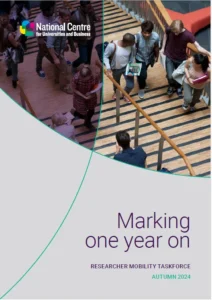NCUB report features DBAA case study – Published: 25 October 2024
NCUB’s Marking one year on: Researcher Mobility Taskforce report came out last week, featuring a case study contributed by Developing Business-Aware Academics
 A new report from the National Centre for Universities and Business (NCUB), ‘Marking one year on: Researcher mobility taskforce’, released on 17th October 2024, highlights the importance of supporting researchers to move between academia and industry and features a case study from the Developing Business-Aware Academics (DBAA) project. The DBAA case study (see below) appeared alongside initiatives such as Prosper and C-DICE, and organisations including the Industrial Decarbonisation Research and Innovation Centre (IDRIC), and CDT in Green Industrial Futures.
A new report from the National Centre for Universities and Business (NCUB), ‘Marking one year on: Researcher mobility taskforce’, released on 17th October 2024, highlights the importance of supporting researchers to move between academia and industry and features a case study from the Developing Business-Aware Academics (DBAA) project. The DBAA case study (see below) appeared alongside initiatives such as Prosper and C-DICE, and organisations including the Industrial Decarbonisation Research and Innovation Centre (IDRIC), and CDT in Green Industrial Futures.
The DBAA case study highlights the work the project is doing to support doctoral and early-career researchers to engage beyond academia through developing skills provision, creating initiatives for networking beyond academia, and providing opportunities for researchers to connect with a growing set of project partners that span academic, industry, non-profit, and governmental organisations. The case study describes how engaging with industry is revealing skills gaps that have the potential to be addressed by collaboration with universities.
Professor Alison Truelove, DBAA Project Director, said: “Through our work to empower and motivate researchers to collaborate beyond academia at an early stage in their careers, we are proud to play a part in enabling them to realise their potential to work alongside non-academic partners to address some of the most pressing challenges of our time”.
The NCUB report reviews the release of their Researcher Mobility Taskforce, one year after its inception. As the report explains, ensuring that researchers are empowered to look beyond academia as they consider their careers is vital to continuing the positive effects of research and innovation on UK society, economy, and culture. In particular, the report notes:
“Only through enhancing the connectivity of our workforce will we create the opportunities that enable innovation.”
The report argues for four priorities to ensure that researcher mobility continues to be supported and encouraged:
- Greater public funding for “business-to-academia” mobility initiatives;
- Recognition of researcher mobility in the Research Excellence Framework (REF);
- Evaluation of current publicly funded mobility support;
- Wider adoption of best practice for innovative organisations.
Read the report, including our case study, on the NCUB website.
DBAA case study
Developing Business-Aware Academics is a four-year, £5m Research England-funded project that aims to break down the barriers to effective collaboration and mobility between academia, industry and policymakers. Based at the University of Exeter, we work with the Chartered Association of Business Schools and a wide range of academic and industry partners to develop training and networking opportunities that equip doctoral and early-career researchers with the skills and mindsets to confidently apply their research beyond academia.
Consulting with a broad range of stakeholders alongside traditional desk-based research, we are establishing a robust evidence base that seeks to better understand gaps in provision and barriers to engagement. This, in turn, is informing the design and roll-out of a wide range of experimental training and networking initiatives that will be fully evaluated for impact and long-term viability, leading to a sustainable legacy of provision to develop the business awareness, impact and success of future researchers.
As we engage with industry leaders, our research is identifying skills gaps that have the potential to be addressed by enhanced collaboration with universities. Evidence from sectors including life sciences, finance, engineering and renewable energy indicates that difficulties in recruiting, retaining and upskilling employees risk jeopardising innovation and profitability. At a national level, this has the potential to hamper economic growth, with significant costs for UK businesses, population health, and the environment.
Our project is facilitating easier access for those outside of academia to ground-breaking research, expertise and facilities that can inform agile business approaches and accelerate innovation. Through our cross-sector activities we champion the benefits of recruiting highly capable researchers into roles aligned or adjacent to their disciplinary specialisms, injecting creativity and evidence-led analytical talent to enhance existing expertise.
As we expand our stakeholder networks, our initiatives are establishing and inspiring new opportunities for dynamic partnerships between academia, industry and policy makers. Over the next few months, we will invite additional university partners to conduct focus groups that extend our understanding of researcher needs across an even broader range of institutional and disciplinary contexts. This will help us to shape our provision to accommodate individual circumstances, needs and interests, and ensure that our programme of initiatives remains inclusive and accessible as well as ambitious. We will also offer funding to partners so they can collaborate with us to develop new, experimental approaches to networking and training, drawing on our evidence base to understand what works and how to maximise engagement and impact.
As universities find themselves subject to increasing public scrutiny over their purpose, the Developing Business-Aware Academics project has an important role to play in demonstrating that researchers are a national asset whose work can lead to increased economic prosperity and social justice. By building their confidence in engaging with non-academic partners we can ensure that, regardless of whether they remain in academia or move on to careers in industry, their expertise is recognised and applied for the benefit of society at large.



















